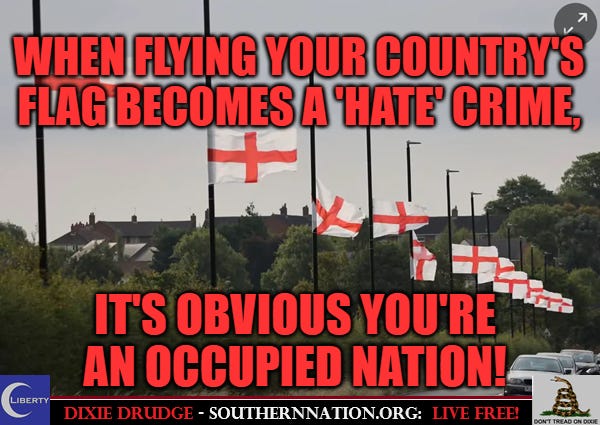NOT JUST CONFEDERATES! Whose Flag Is It Anyway in Britain?
How Patriotism Becomes a Weapon in the Culture Wars
Who cares about an INVADERS feelings? It’s outrageous that flying St. Georges cross would be condemned in England. It’s even more outrageous that supposed ‘British’ politicians are responsible for the mass replacement of British citizens across England, Scotland, and Northern Ireland. Just like our own so-called leaders found when promoting the Amerikan Great Replacement, people will only stand so much. Look for renewed IRA-like activity across the British Isles as they root out traitors that defend the invasion that this author seems to sympathize with. For us, Southerners this glob-idiot’s article seems a rather familiar kind of screed, doesn’t it? - DD
How Patriotism Becomes a Weapon in the Culture Wars
A flag, by itself, is a piece of cloth. The Union Jack, the St. George’s Cross - they are emblems stitched from colour and pattern, nothing more. To say that they are inherently racist is nonsense, and those who defend their display on that basis are correct in the most literal sense. Yet symbols never exist in a vacuum. Their meaning depends on where they are placed, when they are raised, and what stories are being told around them.
This is the tension that lies at the heart of the latest row over flag-waving in England. On the face of it, community groups like the Wythall Flaggers claim nothing more sinister than a desire to brighten the streets with national pride. It’s not racist to love your country, they insist. But timing matters, and so does placement.
When England plays football tournaments in the Euros or the World Cup, the St. George’s Cross is everywhere: fluttering from pub gardens, taped across car bonnets, painted on children’s cheeks. In that context, the flag is a symbol of shared joy - of belonging through sport. It unites strangers in a common cheer when Harry Kane scores, or when Jordan Pickford saves a penalty. Few would suggest that these moments are exclusionary; they are expansive, broadly bringing people together in a burst of collective identity.
But in the summer of 2025, the context could not be more different. Far-right protests have erupted outside asylum seeker accommodation, from Essex hotels to Midlands towns. Daily headlines rail against ‘small boat crossings.’ Politicians scramble to sound tough on immigration. And it is precisely now that flags begin appearing not in gardens or on stadium terraces, but on lampposts, telegraph poles, and even painted across…


